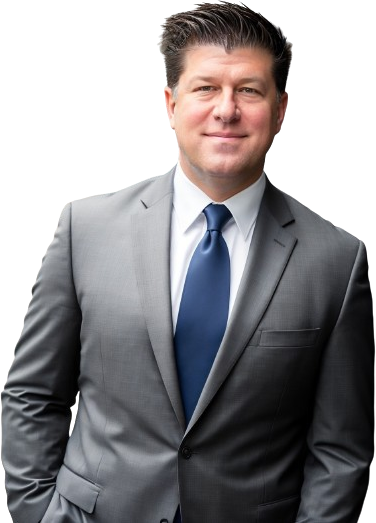
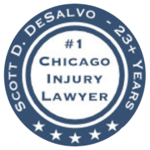

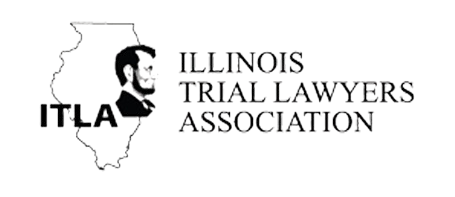
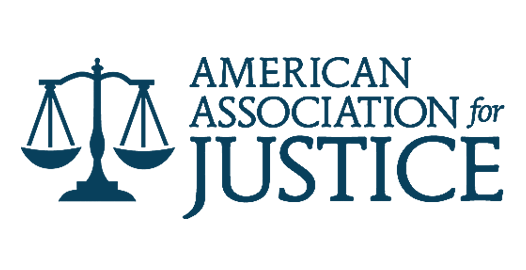
I'll never forget the phone call I got last year from an Elmwood Park family. Their teenage son was riding his bike on North Avenue near Elm Park when a driver who was texting ran a stop sign and hit him. Hard. Broken collarbone, nasty road rash all over his arms and legs, and a concussion that had him throwing up for two days straight.
The medical bills started piling up fast. The family was terrified. And here's the part that really gets me—two other lawyers had already turned them down. Said the case wasn't worth their time. Not enough money in it for them.
That made my blood boil. Because I know exactly what it's like when lawyers don't give a damn about you.
When I was nine years old, my dad got catastrophically injured at work. He was a truck driver, a Teamster, and one day everything changed. The injuries to his neck, back, and spine were permanent. He was never the same man. But what really destroyed our family wasn't just the physical injuries—it was his lawyer.
The case dragged on for seventeen years. Seventeen years of being jerked around by insurance companies and lawyers who treated him like a file number instead of a human being. At the end of it all—and this is the part that still makes me angry—his own attorney sued him for more fees. His own lawyer.
We grew up poor after my dad couldn't work anymore. I watched my mom struggle to keep food on the table. I watched my dad deal with chronic pain and a legal system that chewed him up and spit him out.
That's why I became a personal injury lawyer. And that's why I don't turn people away just because some other attorney thinks their case isn't big enough to bother with.
I met that Elmwood Park family at a coffee shop on Grand Avenue. We sat down, and I listened to their story for over an hour. I explained their rights, what I thought the case was actually worth, and exactly how we were going to fight for them. Six months later, we got them a settlement that covered every single medical bill, compensated their son for the pain he went through, and gave them enough financial breathing room that they could stop losing sleep at night.
That's what I do for people in Elmwood Park and throughout Cook County. When you've been hurt because someone else was careless—whether it's a crash on Harlem Avenue, a fall at a local business, a work injury, or any other kind of accident—you deserve someone who's going to fight for you like you're family.
I work on contingency. That means no money out of your pocket. No fee until we win your case. And you can call me 24 hours a day, 7 days a week, 365 days a year, because injuries don't happen on a convenient schedule and you shouldn't have to wait until Monday morning to get answers.

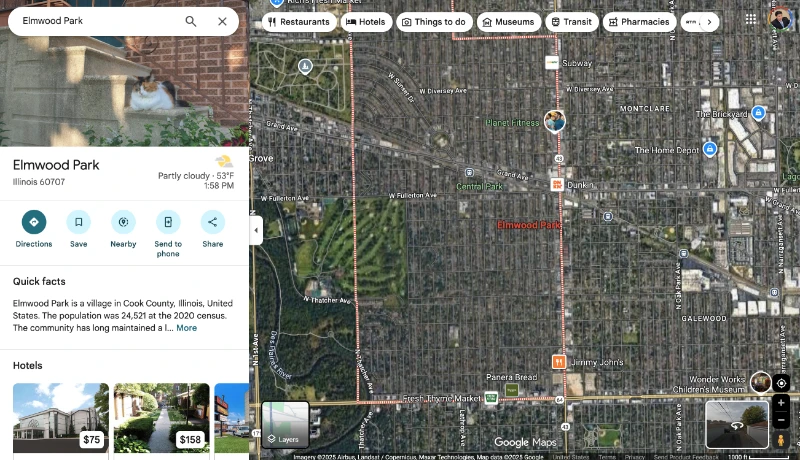
Elmwood Park isn't just another Chicago suburb to me. I've handled cases here. Real cases with real people. I know the intersections where accidents happen most—North Avenue and Harlem, Grand Avenue near the village hall, the residential streets where some drivers think speed limits are just suggestions.
I know that Harlem Avenue turns into an absolute parking lot during rush hour. I know Oak Park is right next door to the east and Franklin Park is just north. When you're dealing with an injury case in Elmwood Park, having a lawyer who understands the local roads, the traffic patterns, and where accidents commonly occur gives you a real advantage when we're building your case and talking to insurance adjusters who've never even been there.
Here's something interesting about Elmwood Park that most people don't know: it was incorporated as a village back in 1914 specifically to avoid being annexed by Chicago. The area was super swampy back then—they used to call it "mud town" because residents needed two pairs of shoes, one for inside and one for the muddy outdoors. But that's not why you're here, so let me get back to what matters for your case.
Whether you got hurt in a car crash, truck accident or it involved a bicycle, bus, train or even Uber or Lyft, we work hard to get you a top settlement fast!
Workers Comp and Third Party Work Injuries are handled with the best speed and professionalism to get you a fast and full recovery for work injuries.
Fell at a business or got bit by a dog or hurt by someone who was intoxicated? We make sure all the boxes are checked in premises liability cases to get it all for our clients.
Medical errors are the third highest cause of death in the United States, and we take an aggessive, meticulous approach to these most challenging cases to win for our clients.
Nursing home cases can involve falls, mistreatment, or bad medical care, but they always involve a betrayal of trust, and that's why we pull out all the stops to maximize results for our clients.
Wrongful death means the loss of life for no good reason, and wrongful death cases require the utmost skill, strategy and professionalism and we deliver for the families who suffer.
Here's something most people don't think about until it's too late: where your lawyer practices matters. A lot.
I've been licensed since 1998. That's over 27 years of practicing injury law in Illinois. My office is at 200 N LaSalle Street in downtown Chicago, right across the street from the courthouse and the Workers' Compensation Commission. I'm not some suburban lawyer who's intimidated by the Cook County court system. I know the judges. I know the procedures. I know how to move cases through this system efficiently.
And here's what really counts: insurance companies know which lawyers are serious about going to trial and which ones are bluffing. When they see my name, they know I've had more than 30 jury trials in personal injury cases, about 100 arbitrations, and hundreds of depositions. They know I'm not afraid of the courthouse. In fact, a judge once told me my presentation was one of the best he'd ever seen. I have more trial experience than lawyers twice my age because I'm not scared to fight.
The insurance industry is a business. Their business is paying you as little as possible. Ideally nothing at all.
I know this because early in my career—after about a year and a half of practice—I went to work for a big defense firm representing insurance companies. I saw how they operate from the inside, and let me tell you, it wasn't pretty. They have entire playbooks dedicated to minimizing claims. They have tactics specifically designed to get you to say things that hurt your case. They count on you not knowing your rights and not having anyone in your corner who does.
That experience is exactly why I came back to representing injured people. My sympathies were always with the middle class, working class, regular folks—not with big corporations trying to pad their profit margins by denying legitimate claims from people who are hurting.
Car accidents are one of the most common types of cases I handle for Elmwood Park residents. With North Avenue running east-west through the village, Harlem Avenue on the eastern border, Grand Avenue cutting through, and quick access to I-290, there's heavy traffic and unfortunately, plenty of crashes.
I handle every kind of car accident you can imagine:
People think car accident cases are simple and straightforward. They're not. There are a thousand ways insurance companies try to minimize your claim or deny it completely if you don't have someone who knows what they're doing fighting for you.
When a commercial truck is involved in a crash, everything changes. These aren't just bigger vehicles—they're governed by federal regulations, they often involve complex corporate ownership structures, and the insurance policies are completely different from regular car insurance.
Elmwood Park sees commercial truck traffic because of I-290 and the industrial areas nearby in places like Franklin Park and Melrose Park. When truck accidents happen, the injuries tend to be catastrophic because of the massive size and weight difference between a semi-truck and a regular car.
I understand the Federal Motor Carrier Safety Regulations. I know how to investigate trucking companies, not just drivers. I know how to prove negligence in hiring, training, or supervision. I know how to go after the company's insurance policy, which is usually way bigger than a regular car insurance policy. Most lawyers don't have this specialized knowledge. I do, because I've invested the time and money to learn it.
There's an unfair bias against motorcyclists and cyclists. Some people—including some jurors—think, "Well, they chose to ride a bike, so they accepted the risk." Or "Motorcycles are dangerous, what did they expect?"
That's complete garbage, and it makes me angry every time I hear it. Motorcyclists and cyclists have every legal right to use the roads safely. When a careless driver hits them because they weren't paying attention or didn't look before turning, that rider deserves full compensation for their injuries.
I've represented motorcycle and bike accident victims from Elmwood Park. These cases are particularly serious because riders have virtually no protection. A crash that might cause minor injuries to someone in a car can result in broken bones, traumatic brain injuries, or worse for someone on two wheels.
You need a lawyer who's going to fight against that bias and make sure you're treated fairly. That's what I do.
Elmwood Park has residential neighborhoods where people walk to local businesses, to Elm Park, to the Metra station, and to schools. Pedestrian accidents happen when drivers aren't paying attention—texting, speeding through residential areas, running red lights, or failing to yield in crosswalks.
If you were crossing the street legally and got hit, you have a case. If you were walking on the sidewalk and a car jumped the curb, you have a case. If you were in a parking lot and a driver backed into you without looking, you have a case.
The human body is no match for a vehicle. Even at low speeds, pedestrian accidents often result in serious injuries—broken bones, head injuries, internal injuries. I take these cases seriously because the injuries are serious.
Elmwood Park has factories, warehouses, retail stores, restaurants, and office buildings. People get hurt at work every single day, and a lot of them don't even realize they have rights under Illinois law.
The Illinois Workers' Compensation Act entitles you to:
But here's the catch: the insurance companies will fight you on these benefits unless you have a lawyer who knows the system.
I handle all kinds of work injury cases:
In workers' comp cases, my fee is set by state law at 20%. That's it. And I make sure you get every single benefit you're entitled to under the law.
People sometimes think slip and fall cases aren't serious or are somehow less legitimate than car accident cases. That's a huge mistake. These cases can actually be harder to win than car accidents, but the injuries are often just as severe—broken hips, broken wrists, head injuries, back injuries.
Property owners in Elmwood Park have a legal duty to maintain safe premises. When they don't, and you get hurt because of wet floors without warning signs, broken or uneven stairs, poor lighting, uncleared ice and snow in winter, cracked sidewalks, or other hazards, they should be held accountable.
The key to winning slip and fall cases is getting evidence quickly—before the property owner fixes whatever caused your fall and then claims it never existed or that you were just being careless. That's why you need to call me immediately after a slip and fall injury, not weeks later.
Illinois has what's called "strict liability" for dog bites. That means the owner is usually automatically responsible when their dog bites someone, regardless of whether the dog has a history of aggression or has ever bitten anyone before.
Dog bite injuries can range from minor scratches all the way up to serious wounds requiring surgery, permanent scarring and disfigurement, and psychological trauma—especially for children who develop a fear of dogs after being attacked.
If you or your child was bitten by a dog in Elmwood Park, I immediately investigate who owns the dog, what insurance coverage exists (homeowners or renters insurance usually covers it), whether the dog has bitten anyone before, and exactly what happened during the attack.
Time matters in these cases because evidence can disappear. Witnesses forget details. The dog owner might get rid of the dog. Call me right away.
When you go to a doctor or hospital, you're putting your life—or your loved one's life—in their hands. Most healthcare providers do their jobs well and actually care about their patients. But when they make mistakes that any competent doctor or nurse would have avoided, and you get hurt as a result, that's medical malpractice.
I handle medical malpractice cases involving:
Medical malpractice cases are complex and expensive to bring. They require expert witnesses—other doctors who will testify about the standard of care. A lot of lawyers won't touch these cases because they're hard and expensive. I will, if your case has merit and I think we can win.
My fee on med mal cases is 33 1/3%, which is the standard rate set by law.
This is heartbreaking work, but it's some of the most important work I do. You put your loved one in a nursing home thinking they'll be safe and well cared for. Life forces difficult choices on us, and entrusting our elderly parents or grandparents to a facility that seems professional is one of those choices. When that facility fails them—when they develop bedsores, suffer from malnutrition or dehydration, get injured in preventable falls, or experience physical or emotional abuse—it's one of life's most profound betrayals.
I've seen bedsores so severe they went down to the bone because staff didn't bother to turn residents regularly. I've seen residents left sitting in their own waste for hours because facilities are understaffed. I've seen staff members physically abusing elderly people who couldn't defend themselves or speak up about what was happening.
If your loved one has been hurt in a nursing home in or near Elmwood Park, please call me. I handle these cases with the compassion and professionalism they deserve, and I hold negligent facilities accountable for what they've done.
Losing a family member because of someone else's negligence is a pain that changes you forever. It's a hole that never really fills back up. I can't bring your loved one back, but I can help you hold the responsible party accountable and get financial compensation for your loss.
Illinois law allows certain family members—spouses, children, parents—to bring wrongful death claims to recover for their loss and to make sure the person or company responsible faces consequences.
Wrongful death cases can arise from:
These cases require sensitivity, compassion, and experience. I've handled wrongful death cases, and I treat them with the respect and seriousness they absolutely deserve. You shouldn't have to go through this nightmare alone.
Some injuries don't just heal up in a few weeks or months. Some injuries change everything about your life, permanently and forever.
Traumatic Brain Injuries (TBI): A blow to the head—even one that doesn't seem that serious at first—can affect your memory, your personality, your ability to work, your relationships with your family. Everything. The brain is truly the seat of our souls, and brain injuries can be devastating. Even what doctors call "mild" concussions can have long-lasting effects that insurance companies love to downplay.
Spinal Cord Injuries: Damage to your spine can result in partial or complete paralysis. These injuries require a lifetime of medical care, home modifications, specialized equipment, and accommodations. The financial impact is enormous, and you need a lawyer who understands how to prove and calculate these lifetime costs.
Amputations: Losing a limb changes everything about how you move through the world. How you work, how you take care of yourself, how you do everyday tasks that everyone else takes for granted. You may need prosthetics, modifications to your home and vehicle, and ongoing medical care and therapy.
Severe Burns: Serious burn injuries often require multiple surgeries, painful skin grafts, and leave permanent scarring and disfigurement that affects everything from your career to your relationships.
These catastrophic injury cases require a lawyer who understands the long-term financial impact. We're not just talking about your current medical bills from the hospital—we're talking about a lifetime of care, lost earning capacity because you can't do your old job anymore, home modifications, pain and suffering that will never go away, and loss of enjoyment of life.
I've invested over $100,000 of my own money flying around the country to study with the best trial lawyers in America. I'm a graduate of the world-renowned Gerry Spence Trial Lawyer's College and the prestigious KTI "The Edge" program. Not one in 10,000 lawyers has completed this level of advanced trial training. I did it specifically so I could handle serious, catastrophic cases like these and get you every dollar you deserve. Because when your life has been destroyed by someone else's negligence, you deserve the very best representation possible.
In Illinois, you generally have two years from the date of your injury to file a personal injury lawsuit. For workers' compensation cases, it's three years, but you have to notify your employer that you were injured within 45 days of the accident.
I know two years sounds like plenty of time. It's not. Evidence disappears. Surveillance video gets erased. Witnesses move away or forget what they saw. And the insurance company becomes more and more aggressive the longer you wait, because they know time is on their side.
If you miss the statute of limitations deadline, your case is over. Done. Finished. The court will throw it out, and you'll never be able to recover a penny for your injuries, no matter how serious they are or how clear it is that someone else was at fault. There are very few exceptions to this rule.
Don't let that happen to you. Call me now while the evidence is still fresh and your legal rights are still protected.
A lot of people think they can only recover their medical expenses. That's wrong, and it's exactly what the insurance company wants you to believe because it lets them pay you way less than you deserve.
Under Illinois law, you can also recover:
Economic Damages:
Non-Economic Damages:
The insurance company isn't going to tell you about all these categories of damages. They want you to think you can only get your medical bills covered and maybe a little something for your trouble. That's one of the main ways they cheat people out of fair compensation.
When I evaluate your case, I look at every single category of damages to make sure you get every dollar you're legally entitled to under Illinois law.
H3: Don't Fall For the Insurance Company's First Offer—It's Always Too Low
Here's how it typically goes down: you get hurt in an accident, and within a few days or maybe a couple weeks, an insurance adjuster calls you. They act all friendly and sympathetic. They say they want to "help" you. They ask how you're doing. And then they offer you money to settle your case right away, quickly, before you even know how serious your injuries really are.
It sounds great, right? Quick money when you're stressed about bills and worried about missing work?
Wrong. Dead wrong.
That initial settlement offer is almost always a small fraction of what your case is actually worth. The insurance company is betting that you don't know any better, that you're desperate for money, and that you'll take whatever they offer just to get something.
Here's the really bad part: once you sign the release and accept their settlement money, you can't come back later and ask for more. Ever. Even if you discover your injuries are way more serious than you thought. Even if you need surgery that you didn't know about at first. Even if complications develop. You're stuck with whatever you accepted, and the insurance company knows this.
Don't sign anything. Don't agree to anything. Don't even give them a recorded statement. Call me first. The consultation is completely free, and I'll tell you what your case is really worth, not what the insurance company wants to pay you.

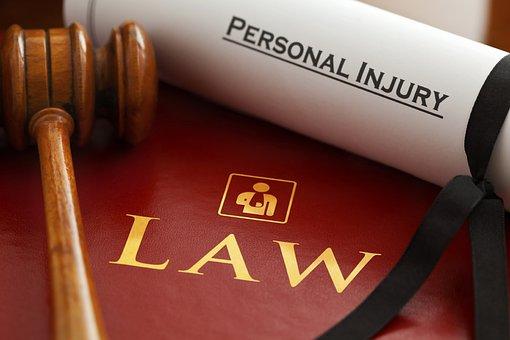

When you call me, here's exactly what happens. No surprises, just the truth:
I don't pressure people. I don't use high-pressure sales tactics. I never chase clients or harass them with phone calls. We talk like regular people, like friends, and I give you straight answers in plain English, not legal jargon designed to confuse you.
Hiring a lawyer is your choice, and you should work with someone you actually like and trust. If we're not a good fit for each other, that's totally fine. At least you'll have gotten some free legal advice and a better understanding of your situation. Sound good?
If you decide to hire me, I get to work immediately. And I mean that same day. Evidence has a nasty habit of disappearing in personal injury cases, and insurance companies know this, so speed matters.
Here's what my team does right away:
My office has proprietary case management software that I developed in-house. It helps us move cases faster and discover information about your case earlier than other law firms. We beat the insurance company to the punch, and that means better results for you.
Your health comes first. Always. Nothing matters more than making sure you get appropriate medical care for your injuries.
If you have health insurance, use it for your medical treatment. If you don't have health insurance or money to pay for doctors, I can connect you with doctors who will treat you on what's called a "lien" basis—they agree to get paid out of your settlement at the end of the case. That means you can get the medical care you need without paying anything upfront.
Here's what's really important: you need to follow your doctor's advice, attend all your appointments, and complete your treatment plan. The insurance company will look for any excuse to argue that you weren't really hurt badly or that you didn't take your injuries seriously. Don't give them that excuse.
I make sure all your medical treatment is properly documented so we can prove your case and show exactly how serious your injuries really are.
Once you've finished your medical treatment—or you've reached what doctors call "maximum medical improvement," meaning you've recovered as much as you're going to—I sit down and calculate the full value of your case.
This isn't guesswork or throwing darts at a board. I use my 27 years of experience handling thousands of injury cases, my knowledge of similar verdicts and settlements in Cook County, and consultation with experts when necessary to determine what your case is actually worth.
I look at everything:
Then I put together a detailed demand package with all the documentation and send it to the insurance company. This isn't some generic letter—it's a comprehensive presentation of your case designed to show them we're serious and we know what we're doing.
I've negotiated literally thousands of injury cases in my career. I know what they're worth, and I absolutely do not back down when insurance companies try to lowball my clients.
About 90% of my cases settle during the negotiation phase before we ever have to file a lawsuit. But that doesn't mean I'm some pushover who rolls over for insurance companies to make my life easier. It means I negotiate aggressively, I fight for every dollar you deserve, and I get my clients fair settlements without putting them through the stress, time, and uncertainty of a trial.
Sometimes the insurance company makes a reasonable offer. Sometimes they don't. I'll always advise you on what I think you should do, but the final decision about whether to accept a settlement is always yours. It's your case, your body, your life.
If the insurance company won't offer fair compensation for your injuries, I file a lawsuit. And I'm not scared of the courthouse. At all.
A lot of lawyers avoid trials because they're expensive, they're time-consuming, and they require actual skill and preparation. But here's the thing: insurance companies know which lawyers are serious about going to trial and which ones are just bluffing to try to get a better settlement.
I'm not bluffing. I've had more than 30 jury trials in personal injury cases in my career, plus about 100 arbitrations and hundreds of depositions. A judge once told me my courtroom presentation was one of the best he'd ever seen. I have more trial experience than lawyers who've been practicing twice as long as I have because I'm not afraid to fight for my clients in front of a judge and jury when that's what it takes.
When the insurance company sees my name on a lawsuit, they know I mean business. They know I've spent over $100,000 of my own money on advanced trial training. They know I'm a graduate of the Gerry Spence Trial Lawyer's College and The Edge program. They know I'm prepared to take this case all the way if they don't make a fair offer.
Whether your case settles during negotiations or we take it all the way to a verdict at trial, my goal is always exactly the same: get you every single dollar you deserve for what you've been through.
When we win, here's how the money works:
If we lose—which rarely happens, but I won't lie and say it never does—you don't pay me anything. Not a penny. That's the contingency fee agreement. I eat all the costs I advanced. You're out nothing.
Pretty good deal, right?
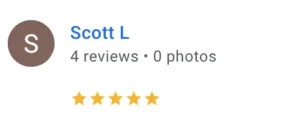
Let me be crystal clear about money because I know it's on your mind and you deserve straight answers.
You pay me nothing out of pocket. Zero dollars. Zilch. I advance all the case costs—filing fees, medical records, expert witnesses, depositions, everything.
I only get paid if you get paid first. That's the deal.
For workers' compensation cases, my fee is 20%, which is set by state law. For personal injury cases, it's 33 1/3%, or 40% if we have to file a lawsuit or go to trial. Medical malpractice cases are 33 1/3%. These are standard rates across Illinois.
If we lose your case—meaning you get nothing—you owe me nothing. I eat all the costs I advanced. You don't pay me back. That's not how most businesses work, but that's how personal injury law works, and it's a pretty good deal for people who've been hurt and need help but don't have money lying around to pay a lawyer.
Injuries don't happen during convenient business hours. You might be lying in a hospital bed at 2 in the morning with questions and nobody to talk to. You might get a call from an insurance adjuster on Sunday afternoon and not know what to say to them.
Call me. Seriously. I'm available 24 hours a day, 7 days a week, 365 days a year. I mean that literally, not as some marketing slogan. When you call, you get actual help from me or someone on my team, not some useless voicemail or answering service that takes a message and tells you someone will call you back in two business days.
Most lawyers go to law school, pass the bar exam, and think they're done learning. Not me. Not even close.
I've spent well over $100,000 of my own money—not the firm's money, my money—flying around the country to study with the absolute best trial lawyers in America. I'm a graduate of the world-famous Gerry Spence Trial Lawyer's College. I've completed the exclusive KTI "The Edge" program. Not one in 10,000 lawyers has done this level of advanced trial training. It's expensive, it's time-consuming, and most lawyers never even consider doing it.
Why did I do it? So you get the absolute best representation possible when you hire me. When you're up against insurance companies with teams of lawyers and unlimited money to fight your claim, you need someone in your corner who actually knows what they're doing. Someone who's invested the time, the money, and the effort to become one of the best trial lawyers around.
That's me. And I did it for you.
When my dad got hurt, his lawyer treated him like garbage. Like he didn't matter. Like he was just another file to bill hours on. I promised myself I would never, ever do that to anyone.
Everyone on my team is trained to understand that winning your case while treating you with honesty, care, and respect is our number one goal. You'll get your phone calls returned. You'll know where your case stands at every step of the process. You'll have your questions answered in language you can actually understand, not legal mumbo-jumbo designed to make lawyers sound smart.
I don't run a personal injury mill where cases get shuffled around to different associates who don't even know your name. I personally handle your case. When you hire me, you work directly with me, not some paralegal or junior lawyer who's never even been to trial.
You know those lawyers who call you repeatedly after you've been in an accident? The ones who somehow got your phone number and won't leave you alone? Or the ones who show up at the hospital trying to sign people up while they're still in pain?
That's not me. I would never do that, and honestly, it makes me sick when other lawyers do it.
I never chase clients. I never hustle or harass people with aggressive sales tactics. If we're going to work together, it's because you want to work with me, not because I pressured you or wore you down with constant phone calls.
We talk like friends. I give you straight answers about your case, even if the answer isn't what you want to hear. You make your own decision about whether to hire me. And honestly, even if you don't hire me, I want us to end the conversation as friends. That's just how I operate.
If a lawyer is putting pressure on you or acting like some high-pressure used car salesman, ask yourself: is that really the person you want representing you for the next year or two on one of the most important matters of your life?
Find Out What YOUR Case Might Be Worth...for free.
Even if you think you're fine—even if you don't feel that hurt right after an accident—go see a doctor immediately. Like, that same day if possible.
Some injuries don't show symptoms right away. Whiplash can take days to develop. Soft tissue injuries might not hurt at first. Even traumatic brain injuries can have delayed symptoms that don't show up until later.
If you wait days or weeks to get medical treatment, the insurance company will absolutely use that against you. They'll argue that you weren't really hurt. They'll say, "If they were actually injured, they would've gone to the emergency room right away or at least seen a doctor the next day." Don't give them that ammunition to use against you.
Go see a doctor. Get checked out. Document your injuries. It protects your health and it protects your case.
Insurance adjusters will call you shortly after your accident. They'll be friendly, sympathetic, concerned about how you're doing. They'll say things like, "We just want to get your side of the story" or "This will only take a few minutes, we just need to know what happened."
And then they'll ask if you wouldn't mind giving a recorded statement about the accident.
Do not do it. Seriously. Just don't.
These adjusters are trained professionals. They go through extensive training on how to ask questions that get you to say things that hurt your case without you even realizing it. They'll get you to minimize your injuries. They'll get you to accept partial fault for the accident. They'll get you to say things that sound completely innocent but are actually devastating to your claim.
I represent people all the time who hire me AFTER they've already given a recorded statement, and usually I can work around it. But sometimes that recorded statement kills the case, or at least makes it worth way less than it should have been.
Just politely tell them you need to speak with a lawyer first. Then call me. That's what I'm here for.
Insurance companies hire people specifically to monitor your Facebook, Instagram, Twitter, TikTok—all of it. They're looking for anything they can use against you, and you'd be amazed at what they'll twist around to hurt your case.
That photo of you smiling at your kid's birthday party? They'll show it to the jury and argue you're not really in that much pain if you can smile in photos.
That post about going to the gym or taking a walk? They'll claim your injuries aren't serious if you're physically capable of exercising.
That check-in at a restaurant or a friend's house? They'll argue you're exaggerating how much your injuries limit your activities.
The best policy is to stay completely off social media until your case is resolved. I know that's hard in today's world where everyone shares everything online, but your case is more important than your Instagram feed. If you absolutely can't stay off social media entirely, at least don't post anything—and I mean anything—about your accident, your injuries, your medical treatment, your physical activities, or anything else that could possibly be twisted against you.
Trust me on this. I've seen cases get destroyed because someone posted the wrong thing on Facebook.
I already talked about this earlier, but it's so important that it's worth repeating: the insurance company's first settlement offer is always, always, always way too low.
They're counting on you being desperate for money. They're counting on you not knowing what your case is actually worth. They're counting on you taking their offer because you think, "Well, at least it's something."
Don't fall for it. Before you accept any settlement offer from any insurance company, call me. I'll tell you if it's fair or if they're trying to rip you off. The consultation is free, so what do you have to lose?
The other driver's insurance company is not your friend. They don't care about you. Their job—their only job—is to pay you as little as possible. Ideally, they'd like to pay you nothing at all.
They might seem really nice on the phone. They might tell you that you don't need a lawyer and that they'll take care of everything for you. They're lying to you. They're trying to save their company money by getting you to accept less than you deserve.
Don't talk to them. Don't give them a statement. Don't answer their questions. Don't sign anything they send you. Just politely tell them you need to speak with a lawyer, and then let me handle all the communication with insurance companies. That's literally what I do for a living.
My office is located on 1000 Jorie Blvd, Ste 204, Oak Brook, Illinois 60523. But I regularly work with clients throughout Elmwood Park and all the surrounding Cook County suburbs, including:
Here's the thing: I know getting to a lawyer's office downtown can be tough when you're injured and dealing with pain or mobility issues. If you can't easily come to my office, I'll come to you. We can meet at your home in Elmwood Park, at a coffee shop on Grand Avenue, at a restaurant, or even at the hospital if necessary. Really, anywhere you feel comfortable.
The point is to make this process as easy as possible for you during what's already a difficult and stressful time in your life.
Elmwood Park is a village of about 25,000 people on the northwest side of Chicago in Cook County. The boundaries are roughly Belmont Avenue to the north, North Avenue to the south, Harlem Avenue to the east (the border with Oak Park), and 80th Avenue to the west.
It's primarily a residential community with a strong Italian-American heritage. The village is served by the Metra Milwaukee District/West Line, which connects Elmwood Park to downtown Chicago and makes it a convenient place to live for people who work in the city.
Elmwood Park was incorporated back in 1914 specifically to avoid being annexed by Chicago. The area used to be super swampy—they called it "mud town" back then—and residents needed two pairs of shoes, one for inside the house and one for dealing with the mud outside.
The village has its own school district (Community Unit School District 401) with schools including Elmwood Park High School, Elm Middle School, and several elementary schools.
But you're not here for a history lesson. You're here because you got hurt and you need help. So let me help you
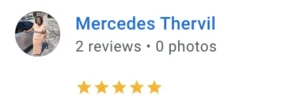
If you've been hurt in Elmwood Park or anywhere in Cook County because of someone else's negligence, you need to act now. Not next week. Not when you "get around to it." Now.
Evidence disappears every single day. Surveillance video gets erased. Witnesses forget what they saw or move away. Your memory of exactly what happened starts to fade. And the insurance company gets more and more aggressive the longer you wait because they know time is on their side.
Call me right now for your free consultation. Remember, I'm available 24 hours a day, 7 days a week, 365 days a year. Even if it's 11 o'clock at night or Sunday morning, call me. I'm here.
Here's what happens when you call:
Remember the deal: no money out of your pocket, no fee until we win your case.
You have everything to gain and absolutely nothing to lose by calling me right now.
Don't let the insurance company take advantage of you during this vulnerable time. Get an experienced Elmwood Park personal injury lawyer who actually gives a damn about you on your side.
Your fight is my fight. That's not just a slogan—that's a promise.
Call me now: (312) 500-4500
I look forward to hearing from you and finding out how I can help.
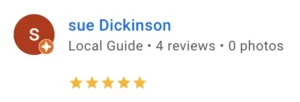
For most personal injury cases, you've got two years from the date you were injured. For workers' compensation cases, it's three years, but—and this is important—you have to notify your employer that you were injured within 45 days of the accident.
There are some exceptions to these rules depending on the specific circumstances of your case, which is why you should talk to a lawyer as soon as possible. If you blow these deadlines, your case is over for good. The court will dismiss it, and you'll never be able to recover compensation for your injuries no matter how serious they are.
Don't take chances with these deadlines. Call me now.
Nothing out of pocket. Zero dollars.
I work on a contingency fee basis, which means I only get paid if you get paid first.
For workers' compensation cases, my fee is 20%, which is set by Illinois state law. For personal injury cases, my fee is 33 1/3%, or 40% if we have to file a lawsuit or go to trial. For medical malpractice cases, it's 33 1/3%. These are standard rates across Illinois.
If we lose your case and you get nothing, you pay me nothing. Not a penny. I eat all the case costs I advanced on your behalf. That's the deal.
It's not ideal, but it's usually not a total disaster either. I can often work with it or work around it.
Sometimes those insurance statements don't really hurt your case at all. Other times they can be problematic or even case-killers, depending on what you said.
The important thing is to call me right now so I can review what you said and figure out the best path forward for your case. And please, don't give them any more statements without talking to me first. Let me handle all communication with the insurance companies from this point forward.
H3: Can I still file a claim if I was partially at fault for the accident?
Yes, you can. Illinois follows what's called "modified comparative negligence."
As long as you're less than 50% at fault for the accident, you can still recover damages. Your award will just be reduced by your percentage of fault.
For example, let's say your total damages are $100,000, but the jury finds you were 20% at fault for the accident. You'd recover $80,000 (which is $100,000 minus 20%).
But if you're found to be 50% or more at fault, you get nothing. That's why it's so important to have a good lawyer who knows how to argue fault and minimize your percentage of responsibility.
Don't let that stop you from getting the medical care you need. There are doctors and medical facilities that will treat you on what's called a "lien" basis.
A lien means the doctor agrees to get paid out of your settlement or verdict at the end of your case. So you can get treatment now without paying anything upfront, and the doctor gets paid later when we win your case.
I can help connect you with doctors who work on a lien basis if you need it. Your health is the most important thing, and you shouldn't avoid getting medical treatment just because you don't have insurance or money right now.
It depends on a lot of factors, and anyone who gives you a definite answer without knowing the details of your case is lying to you.
I once settled a case in 30 minutes. I've settled others in a few months. Most cases that settle take somewhere around a year, give or take. If we have to file a lawsuit and go all the way to trial, it could be two years or more.
The timeline depends on things like:
What I can promise you is that I push every single case as hard as possible because you don't get paid waiting around, and neither do I.
Maybe not. About 90% of my cases settle before we ever have to go to trial.
If we do have to file a lawsuit, you might need to come downtown to the courthouse 2-3 times before trial for things like your deposition (where the other side's lawyer asks you questions under oath). And if we actually go to trial, you'll need to be there for the entire trial from start to finish.
But the vast majority of cases never get that far because we settle them during negotiations.
It's not automatically a deal-breaker. The law allows you to make a claim for what's called "exacerbation of a pre-existing condition"—which means your accident made an existing problem worse.
The key is being 100% honest and upfront about your medical history from the very beginning. The insurance company is going to find out about your prior injuries anyway when they get your medical records. If they think you lied or hid something, it destroys your credibility and can wreck your case.
Honesty is always the best policy. Always.
No. It's a violation of federal law for your employer to fire you or retaliate against you in any way for filing a workers' comp claim. It's your legal right to file a claim if you're injured at work.
That said, proving that you were fired specifically for filing a workers' comp claim (and not for some other reason your employer makes up) can be tricky. But I handle these "retaliatory discharge" cases, and I know how to prove them.
You might still be able to recover compensation through your own insurance policy if you have what's called "uninsured motorist coverage" or "UM coverage."
This is coverage you purchase on your own auto insurance policy that protects you when you're hit by a driver who has no insurance or not enough insurance. A lot of people don't even realize they have this coverage because they've never looked at their policy carefully.
I check every insurance policy very carefully to find all possible sources of recovery for my clients. Sometimes there's coverage available that even the insurance company doesn't mention to you.
>> Go To Main Topic Page
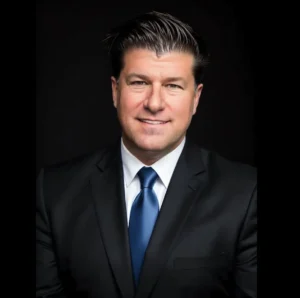
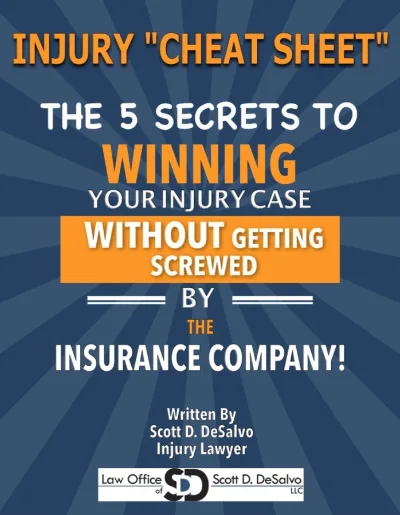

Scott DeSalvo founded DeSalvo Law to help injured people throughout Chicago and surrounding suburbs. Licensed to practice law in Illinois since 1998, IARDC #6244452, Scott has represented over 3,000 clients in personal injury, workers compensation, and accident cases.
No Fee Unless You Win | Free Consultation | 24/7 Availability Call or Text: (312) 500-4500
>>Read More
Main Office:
1000 Jorie Blvd Ste 204
Oak Brook, IL 60523
New Cases: 312-500-4500
Office: 312-895-0545
Fax: 866-629-1817
service@desalvolaw.com
Chicago and Other Suburban Offices
By Appointment Only